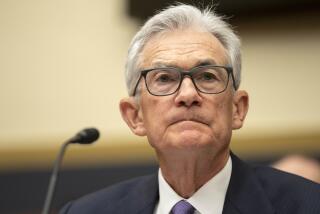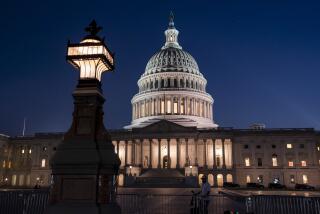Senate panel approves Yellen nomination to lead Fed
WASHINGTON — President Obama’s nomination of Janet L. Yellen to be the next leader of the Federal Reserve cleared the Senate Banking Committee on Thursday — and perhaps just in the nick of time.
Moments after the banking panel voted 14 to 8 to send the nomination to the full chamber for a final vote, Senate Democrats pushed through a landmark change in filibuster rules that will make it more difficult for Republicans to block confirmation of most of the president’s nominees.
Although the committee vote was never seriously in doubt after her impressive Senate hearing appearance last week, the filibuster change left some analysts wondering whether Republican senators, angered by the rule shift, might have tried to hold up Yellen’s nomination in committee. She won the support of three GOP members on the panel, and one Democrat voted against her.
“She may have dodged a little bit of a bullet there,” said Jared Bernstein, former chief economic advisor to Vice President Joe Biden and now senior fellow at the Center on Budget and Policy Priorities.
Safely out of committee and now with the curtailment of the filibuster, Yellen’s nomination looks even more like it’s in the bag.
Republican Sen. Rand Paul of Kentucky, a strong Fed critic, had threatened to delay a Yellen confirmation vote by the full Senate. With 55 Democrats in the Senate, under the now-scrapped rule, it would have taken a super-majority of 60 votes to break a filibuster. Now a simple majority would be enough.
Either way, Yellen was expected to be confirmed. In addition to the three GOP members on the Banking Committee who voted for Yellen, who is currently the Fed’s vice chair, it appeared that a number of other Republicans were prepared to support the nomination.
Senate Democratic leaders had sought the limit on filibusters because of repeated blocks on President Obama’s picks for judicial and other high-level posts. Republicans immediately decried the action as a power grab and an affront to long-standing Senate procedures.
Analysts said the furor over the rule change could prompt Republicans to use every means to delay or complicate the process of confirmation. And it wasn’t clear whether that would enter into play in securing a date for a final vote on Yellen’s nomination, although most still expect her to be confirmed by the end of the year.
“It may poison the well, but I don’t see what the Republicans can do at this point,” said Carl Tobias, a professor at the University of Richmond Law School who specializes in the confirmation process. “I think she can start planning to be the next Fed chief in short order.”
The only question now appears to be whether Yellen will get more than the 70 votes that current Fed Chairman Ben S. Bernanke received in 2010. That was the lowest ever for a Fed chief confirmation. She is widely expected to push the Fed along the path set by Bernanke, maintaining easy-money policies to foster stronger growth in the economy, particularly the job market.
Bernanke is stepping down at the end of January after two four-year terms as chairman during a tumultuous period for the American economy and financial system.
He has led a Fed that has taken unprecedented actions to resuscitate an economy that saw its biggest fall since the Great Depression and has expanded at a disappointing pace since recovering in mid-2009. Many Republicans have strongly opposed the central bank’s purchases of tens of billions of dollars of bonds every month as a way of suppressing interest rates and stimulating investment and spending.
Yellen is widely expected to push the Fed along the path set by Bernanke, maintaining easy-money policies to foster stronger growth in the economy, particularly the job market.
Though the former Cal Berkeley professor has been portrayed by some as being soft on inflation, analysts said her record suggests otherwise. And although a number of Republicans have voiced their opposition to her nomination, her performance during a Senate confirmation hearing last week appeared to have won over some conservatives.
“She handled herself very well,” said John Makin, a resident scholar at the conservative-leaning American Enterprise Institute, a Washington think tank.
More to Read
Inside the business of entertainment
The Wide Shot brings you news, analysis and insights on everything from streaming wars to production — and what it all means for the future.
You may occasionally receive promotional content from the Los Angeles Times.










